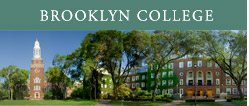Grants and Research
Research is one of the cornerstones of every academic institution. The Brooklyn College faculty have been actively involved in research for decades and continue to be at the forefront of their fields.
We are pleased to present news of our faculty’s success in receiving grants and fellowships from such sources as the National Institutes of Health, the National Science Foundation, the Fulbright Program and the Guggenheim Foundation as well as from private corporations interested in establishing a partnership with the college to advance scientific research. A brief synopsis of the research and the grant is provided below. You can also connect to the profile page of each faculty member whose work is featured here.
 Faculty: Kai Shum, Physics
Faculty: Kai Shum, Physics
Project Title: Optical Investigation of UD930 Materials and
Related Compounds
Project Period: June 1, 2009 - May
31, 2010
Total
Award: $123,000
Abstract: OmniPV, a private
company based in California, has been collaborating with Dr. Shum for more than
a year. Their successful collaboration on Shum's project—to develop a new
generation of solar cells—has lead to a second year of funding, discussion of
creating a New York-based operation, and collaborating on grants applications to
federal and state agencies.
Read More >>
 Faculty: James Nishiura, Biology
Faculty: James Nishiura, Biology
Project
Title: Genetic Analysis of Mosquito Metamorphosis
Project Period: July 20, 2009 - June 30,
2013
Total Award: $471,000
Abstract: Mosquitoes are not merely pests;
they can transmit the agents that cause such deadly and seriously
debilitating diseases as malaria, dengue fever and West Nile encephalitis. The
long-term goal of this research is to understand the molecular mechanisms that
control mosquito larval growth and metamorphosis in order to identify potential
targets that can be exploited to better control the number of blood-sucking,
disease-carrying mosquitoes. We propose to test, by knockdown of gene
expression, the hypothesis that the genes broad and methoprene tolerant are
central to mosquito development, and are in the pathway by which some
insecticides block mosquito development.
 Faculty: Charlene Forest, Biology
Faculty: Charlene Forest, Biology
Project
Title: Cloning and Analysis of a Gamete Fusion Gene
Project
Period: June 1 - October 31, 2009
Total
Award: $26,084
Abstract: Forest
received an American Recovery and Reinvestment Act supplement to her current NIH
award to support undergraduate students and local educators in her lab.
The research done in her lab will lead to understanding the molecular basis of
gamete fusion in a simple model system, which may lead to new approaches for the
treatment of human infertility (some types of infertility in mammals may be
caused by the failure of sperm-egg fusion) as well as new types of
contraceptives (molecules that impair fusion can exhibit contraceptive
activity).
 Faculty: Aaron Kozbelt, Psychology
and Scott D. Dexter, Computer
and Information Science
Faculty: Aaron Kozbelt, Psychology
and Scott D. Dexter, Computer
and Information Science
Project Title: Dynamic Cognitive
Analyses of Creativity, Expertise and Aesthetics in Software
Development
Project Period: August 1, 2009 - July 31,
2012
Total Award: $698,992
Abstract:
This project compares three groups of programmers—open-source software
contributors, proprietary programmers and novice coders—on three sets of
variables: 1) aesthetic judgment criteria of software, 2) verbal protocol
measures of cognitive processes occurring during creative problem solving while
revising code, and 3) ontogenetic quality trajectories as code is revised. This
work has the strong potential to yield new psychological models of creativity by
shedding light on the dynamic problem-solving and evaluative processes that
drive the ontogenesis of creative products. The comparison of two different
groups of experts is also a novelty, certainly within the field of software
design, and is atypical of cognitive studies of expertise more generally. This
research also promises to help answer broader questions on the nature of
creativity and to contribute to ongoing debates in computer science, software
engineering, organizational behavior, cognitive psychology and aesthetics, on
how to promote innovation, on the kinds of mental processes contributing to
creativity, and on the basic nature of quality of creative artifacts, such as
software.
















